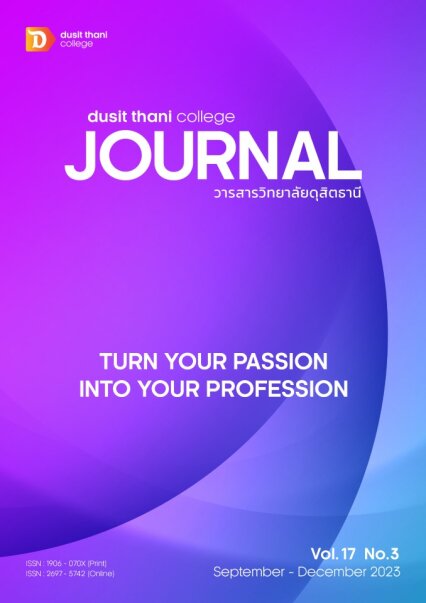การประยุกต์ใข้แนวคิดเมตาเวิร์สในการสอนวิชาศิลปะการประกอบอาหาร
Main Article Content
บทคัดย่อ
แนวคิดการใช้เมตาเวิร์ส (Metaverse) กำลังเข้ามามีบทบาทในชีวิตประจำวันของผู้คนในแวดวงต่าง ๆ ไม่เว้นแม้แต่วงการศึกษาเองก็มีความตื่นตัวในการศึกษาความเป็นไปได้ในการใช้แนวคิดเมตาเวิร์ส ในการจัดการเรียนการสอนให้แก่ผู้เรียนทั้งภาคทฤษฎีและปฏิบัติ โดยวิชาศิลปะการประกอบอาหารเป็นหนึ่งในวิชาที่เน้นการปฏิบัติการและน่าสนใจศึกษาหาแนวโน้มการใช้เมตาเวิร์สเข้ามาช่วยสนับสนุนการจัดการเรียนการสอนเพื่อให้ได้ผลสัมฤทธิ์ทางการเรียนรู้แก่ผู้เรียนอย่างสูงสุด วัตถุประสงค์ของการศึกษานี้เพื่อศึกษาข้อมูลจากแบบสอบถามผู้ใช้งานเว็บไซต์เพื่อการเรียนรู้ตำรับอาหาร Web-based recipe learning (WBL) ถึงแนวโน้มการใช้เมตาเวิร์สที่ผู้ตอบแบบสอบถามเห็นว่าน่าสนใจในการพัฒนานำมาใช้ร่วมกับ Web-based recipe learning (WBL) ผลการตอบแบบสอบถามพบว่าภาพรวมของการใช้เทคโนโลยี Augmented Reality (AR) รูปแบบต่าง ๆ ได้รับความสนใจจากผู้ตอบแบบสอบถามมากกว่าเทคโนโลยี Virtual Reality (VR) และข้อเสนอแนะในการพัฒนาการจัดการเรียนการสอนด้วยเทคโนโลยีเมตาเวิร์สจากแบบสอบถามของผู้ใช้งานให้ความคิดเห็นว่า โปรแกรมสนับสนุนการเรียนรู้วิชาศิลปะการประกอบอาหารควรมีลักษณะช่วยทบทวนหรือแสดงลำดับวิธีการปรุงอาหารก่อนการฝึกปฏิบัติจริง, ให้ข้อมูลของวัตถุดิบแต่ละชนิดที่ใช้ในการประกอบอาหารแต่ละตำรับ, มีเนื้อหาภาพจำลองของวัตถุดิบ หรืออยู่ในรูปแบบสารานุกรมภาพเสมือนจริง หากโปรแกรมฝึกปฏิบัติมีการโต้ตอบกับผู้เรียนโดยปัญญาประดิษฐ์หรือจากอาจารย์ผู้สอนแบบ Synchronous จะได้รับความสนใจเพิ่มยิ่งขึ้น
Article Details

อนุญาตภายใต้เงื่อนไข Creative Commons Attribution-NonCommercial-NoDerivatives 4.0 International License.
นโยบายการพิจารณากลั่นกรองบทความ
- บทความวิจัยและบทความวิชาการทุกเรื่องที่จะได้รับการตีพิมพ์ต้องผ่านการพิจารณากลั่นกรองโดยผู้ทรงคุณวุฒิ (Peer Review) ในสาขาที่เกี่ยวข้อง จำนวน 3 ท่าน/บทความ
- บทความ ข้อความ ภาพประกอบและตารางประกอบที่ลงตีพิมพ์ในวารสารเป็นความคิดเห็นส่วนตัวของผู้เขียน กองบรรณาธิการไม่จำเป็นต้องเห็นด้วยเสมอไป และไม่มีส่วนรับผิดชอบใด ๆ ถือเป็นความรับผิดชอบของผู้เขียนแต่เพียงผู้เดียว
- บทความที่จะได้รับการตีพิมพ์จะต้องไม่เคยตีพิมพ์ เผยแพร่ที่ใดมาก่อน และไม่อยู่ระหว่างการพิจารณาของวารสารฉบับอื่น หากตรวจสอบพบว่ามีการตีพิมพ์ซ้ำซ้อน ถือเป็นความรับผิดชอบของผู้เขียนแต่เพียงผู้เดียว
- บทความใดที่ผู้อ่านเห็นว่าได้มีการลอกเลียนหรือแอบอ้างโดยปราศจากการอ้างอิง หรือทำให้เข้าใจผิดว่าเป็นผลงานของผู้เขียน กรุณาแจ้งให้กองบรรณาธิการวารสารทราบจะเป็นพระคุณยิ่ง
เอกสารอ้างอิง
Adedoyin, O. B., & Soykan, E. (2020). Covid-19 pandemic and online learning: the challenges and opportunities. Interactive Learning Environments, 1-13.
Mulyatiningsih, E., Palupi, S., Ekawatiningsih, P., & Firdausa, A. R. (2021). The Characteristics of Enjoyable Online Learning for Culinary Arts Student. arXiv preprint arXiv:2107.14043.
Wang, C. Y., & Tsai, M. J. (2017). Students’ self-efficacy and attitudes toward web-based recipe learning in Taiwan culinary education. The Asia-Pacific Education Researcher, 26(3), 193-204.
Sharka, R., Abed, H., & Dziedzic, A. (2020). Can Undergraduate Dental Education be Online and Virtual During the COVID-19 Era? Clinical Training as a Crucial Element of Practical Competencies. MedEdPublish, 9.
Durand, M. D. T., Restini, C. B. A., Wolff, A. C., Faria Jr, M., Couto, L. B., & Bestetti, R. B. (2019). Students’ perception of animal or virtual laboratory in physiology practical classes in PBL medical hybrid curriculum. Advances in physiology education, 43(4), 451-457.
Vrigkas, M., Lappas, G., Kleftodimos, A., & Triantafillidou, A. (2021). Augmented Reality for Wine Industry: Past, Present, and Future. In SHS Web of Conferences (Vol. 102, p. 04006). EDP Sciences.
Sukiran, S. R., Ismail, I. M., Halim, H., Ismail, M. E., Amiruddin, M. H., & Razali, N. (2018). THE ASSESSMENT OF THE EFFECTIVENESS OF PRACTICAL COOKING HANDBOOK BASED ON AUGMENTED REALITY APPLICATION IN DOMESTIC SCIENCE. Human Sustainability Procedia.
Chicchi Giglioli, I. A., Bermejo Vidal, C., & Alcañiz Raya, M. (2019). A virtual versus an augmented reality cooking task based-tools: a behavioral and physiological study on the assessment of executive functions. Frontiers in psychology, 10, 2529.
Aguilar, J. G. S., & Aguilar, I. A. (2019). Interactions between human, computer and food. Food Nutr OA, 2(2), 116.
Ratan, R. (2021, October 30). What is the metaverse? 2 media and information experts explain. Encyclopedia Britannica. Retrieved from https://www.britannica.com/story/what-is-the-metaverse-2-media-and-information-expertsexplain
Lowood, H. E. (2021, May 13). virtual reality. Encyclopedia Britannica. Retrieved from https://www.britannica.com/technology/virtual-reality
Hosch, W. L. (2021, February 11). augmented reality. Encyclopedia Britannica. Retrieved from https://www.britannica.com/technology/augmented-reality
Squires, D. R. (2014). M-Learning: Implications in Learning Domain Specificities, Adaptive Learning, Feedback, Augmented Reality, and the Future of Online Learning. Journal of Educational Technology, 11(3), 1-8.
World Health Organization (2021, October 1). Advice for the public: Coronavirus disease (COVID-19). Retrieved from https://www.who.int/emergencies/diseases/novel-coronavirus-2019/advice-for-public
Costley, K. C. (2014). The Positive Effects of Technology on Teaching and Student Learning. Online submission.


